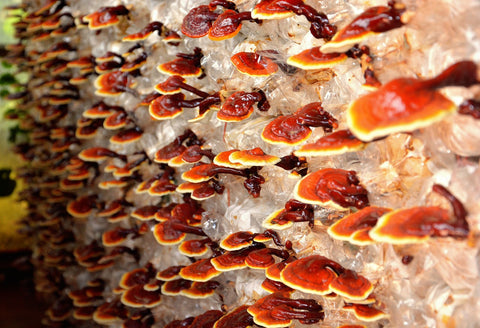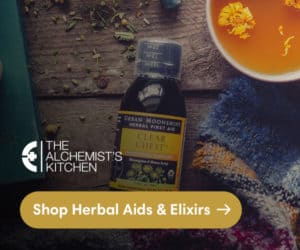As the days shorten and we find ourselves in the dark of mid-winter, the temperatures drop and often, so does our immune defense. During these colder months it may seem that everyone is sick, or at least coughing and wiping a constantly running nose. Luckily, we can spare ourselves by turning to herbal allies to strengthen immunity! The immune system is one of the most complex bodily systems – second only to the nervous system – and is responsible for recognizing and fighting off pathogens, neutralizing environmental contaminants, and eliminating our own cells that have changed or malformed due to illness, viruses, etc.
When it comes to herbs, they tend to fall into three general, and somewhat overlapping, categories: immunostimulants, immunomodulators, and immune tonics. We want to use different herbs at different stages of building immunity.
Immunostimulants are best used at the first twinge of sickness, when traveling, or when you know you’ve been directly exposed to ill and contagious people. Immunomodulators improve the immune system by helping to regulate it, and boosting chronic low immune response to combat recurring ailments and infections, or calming an overactive immune response. Immune tonics work to strengthen and balance the immune system over long periods of time.
As always, make sure you are sourcing your herbal remedies from reputable companies that use organic or ethically wildcrafted herbs. Most of the herbs listed below can be taken in various forms like tinctures, syrups, capsules, teas, powders, vinegars, and oxymels.
Immunostimulants: When You Start Feeling Sick
These herbs activate the immune system by inducing or boosting the processes of one or several of its components.
-
-
Echinacea (Echinacea purpurea)
A classic and familiar herb known for its immune boosting properties, echinacea stimulates the production of white blood cells and spleen cells, important factors in instigating immune response. Taking echinacea also raises core body temperature, which helps to fight off infections and pathogens. Echinacea should be taken as soon as symptoms of illness arise and continued until symptoms have subsided for at least 48 hours. Avoid taking echinacea unless experiencing sickness, and not as a daily preventative measure. Those with autoimmune diseases and those taking immunosuppressant herbs should avoid echinacea altogether.

- Garlic (Allium sativum)
This easily accessible kitchen herb packs a very powerful punch! It is strongly antiviral, antifungal, and helps to increase the rate of production of natural killer cells which, a fundamental part of the nonspecific immune response; these cells attack and kill all pathogenic invaders. Garlic can be used in acute cases of illness, but may also be taken long term to reduce cholesterol, lower blood pressure, and regulate blood sugar levels. Since it’s a culinary herb, garlic can be simply eaten raw and fresh when symptoms arise, or put into a spoonful of honey, soup, or boiled to make a quick and potent tea.
-
Immunomodulators: Regulate Your Immune System
These herbs work to balance the immune system, promoting immune response when under active, and calming immune response when over active or autoimmune.
-
Astragalus (Astragalus propinquus)
This herb is popular in Traditional Chinese Medicine formulas, used to strengthen the body against disease. Astragalus is also an adaptogenic herb, which means it helps the body adapt to the effects of physical, emotional, and mental stress. With an impressive antioxidant, antibacterial, and anti inflammatory effects, astragalus has been shown to be an effective herb for supporting the immunity, especially for those with weak or run down responses due to chemotherapy and radiation. Astragalus should not be taken in cases of acute sickness, or for the common cold, as it may inhibit the pathogen from exiting the body quickly– it is best taken over a period of several months, then reassessed by an herbal practitioner.

-
Schisandra (Schisandra chinensis)
Schisandra is another renowned Chinese herb– its name in Chinese means “5 flavored berry” for it contains all five flavors: salty, sweet, sour, pungent/spicy, and bitter. Schisandra is a wonderful adaptogenic herb which nourishes and tones the immune system, and helps to protect the body against disease. It is antioxidant and can help to enhance cognitive function. Schisandra has been used with impressive results for recovery after surgery or to increase overall physical stamina. Like all immunomodulators, it can stimulate an underactive immune system and help to calm the immune response in an overactive one.

Immune Tonics: Long-term Strength & Balance
These herbs are safe, beneficial herbs that can be taken over a long period of time to build and strengthen a healthy immune system.
-
Elderberry & Elderflower (Sambucus Nigra)
Popular and tasty elderberry has been recently touted as a flu and cold remedy, and is even sold over the counter in many conventional pharmacies. It has potent antiviral properties and a higher concentration of flavonoids and antioxidant activity than goji berries and blueberries. Elderberry also aids in boosting and regulating cytokines– important messenger chemicals– in the immune system. Elderberry can be taken over a long period of time, as a preventative measure when traveling or during cold and flu season, or as an acute remedy. Elderflower, the flowering precursor to Elderberry, also has antibacterial and antiviral properties and may also help alleviate allergies and fevers.

-
Medicinal Mushrooms
Medicinal mushrooms like Cordyceps, Lion’s Mane, Reishi & Turkey’s Tail (Cordyceps Sinensis, Hericium Erinaceus, Ganoderma Lucidum, Trametes Versicolor)
Many immune tonics are also immunomodulators; for example, these medicinal mushrooms contain β-glucans or polysaccharide-protein complexes which potentiate the body’s specific and nonspecific immune responses which are responsible for maintaining homeostasis. Similarly to elderberry, many medicinal mushrooms aid directly in the production and regulation of cytokines. In addition, in both preclinical models and clinical trials, research has shown that polysaccharides in mushrooms have anti-tumor activities as well as the ability to induce apoptosis– programmed cell death– in cancerous cells. Medicinal mushrooms are best taken over a period of at least several months to enhance overall immunity.

For more herbal aids and elixirs to boost immunity see our collection:







